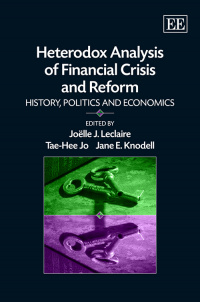[This piece is a part of the memorial for John F. Henry, published in the Journal of Economic Issues, Volume 55, Issue 3, September 2021, pp. 870-889. ] [Download the free eprint]
***
On UMKC, Marx, and Veblen
Tae-Hee Jo
Upon retiring from CSU-Sacramento after spending 35 years (1970-2005), John joined UMKC. His arrival at UMKC made its growing heterodox economics program more vibrant and stronger. Doubtless, graduate students were most benefited from John—not only his in-depth knowledge but also his dedication to students. He always welcomed students whenever they had a question regarding economics, social issues, films, baseball (he was a big St. Louis Cardinals fan), and so on. He sat on a number of dissertation committees and gave students swift and encouraging comments within a few days (sometimes within a few hours). He was a mentor of almost all UMKC doctoral students. In the interview conducted a day before his ‘second’ retirement event in April 2014, John said that “the best experiences [at UMKC] have been with students.” No wonder that students greatly appreciated what John did for them as evidenced by numerous acknowledgments included in their dissertation. John demonstrated how the instincts of parental bent, idle curiosity, and workmanship can have a positive effect on student’s thinking, work, and life. I am, like other UMKC students, privileged to know John, an open-hearted mentor, role model, eloquent writer, intellectually honest scholar, and ‘honorable’ person (not the kind of Decimus Junius Brutus, but of Marx, Veblen, and John Brown).
Frederic Lee and I edited a festschrift, Marx, Veblen, and the Foundations of Heterodox Economics (2015), to recognize John’s distinctive and significant contributions to heterodox economics. As the title indicates John’s contributions are centered around and expand on the ideas of Marx and Veblen. Why Marx and Veblen? Essentially, both thinkers provide a theoretical framework shedding critical light on the social foundations of capitalism, in which property and class relationships are sine qua non. If one bases her or his analysis on social foundations, John argues, an ensuing theory cannot be natural, normal, and universal (which are the characteristics of neoclassical economics that John considered the ‘illusion’ of our epoch). Capitalist society is invariably organized in such a way as to serve the vested interests of the ruling capitalist class—that is, the incessant accumulation of capital and power—at the expense of the underlying population. The most relevant theoretical framework of explicating the formation and evolution of such an exploitive, predatory, discordant, and invidious system of institutions is offered by Marx and Veblen (and Keynes to a lesser extent). A heterodox theory drawing upon the ideas of Marx and Veblen challenges the status quo and the prevailing institutions—that is, seeking a fundamental change in society. Therefore, heterodox economics, as understood and practiced by John, is (and should be) dangerous from the views of mainstream economists and those who get benefits from the existing society (Henry 2009, 2010, 2011, 2015, 2018).
John’s approach integrating the ideas of Marx and Veblen is quite distinctive from that of Marxians and institutionalists who tend to dissociate two thinkers. John’s position is thus not always respected by both sides. But he kept ‘radical’ Veblen alive in institutional economics represented by AFEE and AFIT, about which John cared much. In his Veblen-Common Award speech, John spoke to his fellow institutionalists that they should make intellectual arguments along with political movements “to unseat the vested interests, “the honorable,” who are the beneficiaries of the historically generated arrangement of inequality, and who will fight “tooth and nail” to retain their privileged positions” (Henry 2017, 260). He believed that “we have the will, the intelligence, the courage to work toward a world of simple decency” (Henry 2015, 296). This is one of John’s legacies to be remembered and continued.
References
Henry, John F. 2009. “The Illusion of the Epoch: Neoclassical Economics as a Case Study.” Studi e Note di Economia 14 (1): 27-44.
Henry, John F. 2010. “Minsky, Marx, Veblen and Chicago.” Paper presented at the Minsky Summer School, Levy Economics Institute. Available at http://www.levyinstitute.org/pubs/Henry.pdf. Accessed November 23, 2020.
Henry, John F. 2011. “Sismondi, Marx, and Veblen: Precursors of Keynes.” In Heterodox Analysis of Financial Crisis and Reform, edited by Joëlle Leclaire, Tae-Hee Jo, and Jane Knodell, 72-83. Cheltenham, UK: Edward Elgar.
Henry, John F. 2015. “Property and Its Limits to Democracy.” In Marx, Veblen, and the Foundations of Heterodox Economics: Essays in Honor of John F. Henry, edited by Tae-Hee Jo and Frederic S. Lee, 277-297. London: Routledge.
Henry, John F. 2017. “Brutus Is an Honorable Man.” Journal of Economic Issues 51 (2): 249-261.
Henry, John F. 2018. “Society and Its Institutions.” In The Routledge Handbook of Heterodox Economics, edited by Tae-Hee Jo, Lynne Chester, and Carlo D’Ippoliti, 163-175. London: Routledge.


















You must be logged in to post a comment.